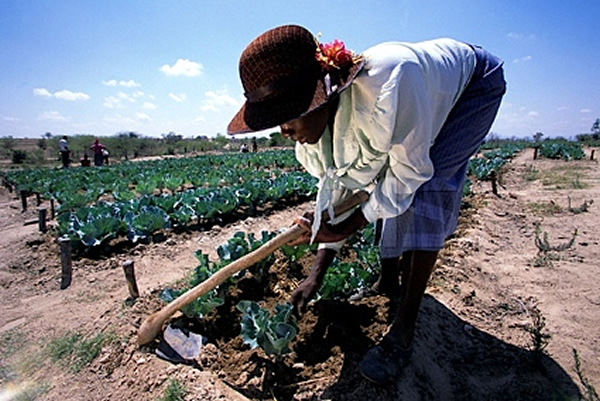Kotwa women market gardeners bemoan lack of collateral
By Prince Njagu
In efforts to counter poverty and continued economic problems being experienced in the country, women in Kotwa, Mashonaland East have come up with irrigation based market gardening projects to sustain themselves.

Situated 20 Kilometres from the Nyamapanda-Mozambique border post; Kotwa is a small growth point in the Mashonaland East District were low rainfall patterns are experienced.
The blazing hot weather conditions make the area not–suited for agriculture; this remote growth point houses many small–scale; subsistence farmers who traditionally scraped a living from cultivating the staple maize plant.
Through irrigation ventures’ women living in this area are trying to find ways of evading poverty.
“I am a single mother and I have been looking after my four children for the past six years…this house that you see here I built using the money from the irrigation project;” said one Elizabeth.
She explained how her husband had left her during the re-run to the 2008 Presidential elections and how she had seen her first son through tertiary education at Midlands State University through earning from the irrigation venture.
The women are engaged in the production of vegetables and tomatoes which they sell at Nyamapanda boarder post marketplace, with some women who produce in large quantities opting to go to Kuchamano, the Western Mozambican Province of Tete while some use the popular “Roti” marketplace.
One Chenai Meza highlighted that they had to spend between three to four days at the roadside waiting for international trucks to fare their produce to “Roti”.
The women try to capitalize on every opportunity which allows them make ends-meet for their families; but recently the market has been flooded.
“Our Kotwa marketplace has seen new players join in and the increase in the number of horticulture farmers in our area, supply has surpassed demand which has forced us to seek new markets.
“In most cases our tomatoes will rot before we have sold them, so we are appealing to responsible authorities to chip in and help us push our produce,” said Chenai.
Flooding in the marketplace has seen the women seek new hunting grounds.
Chenai says she nets an average of $500 a month when business is good and this is usually during the summer period.
“We as women in the Meza village we are appealing to the government to chip in our small initiative and provide us with a helping hand so that we can mass produce our tomatoes and vegetables”, said Mercy Karavhima.
She went on to narrate the women’s ordeal on how they were facing challenges in transporting their produce, how they have to constantly dig up small wells to sustain their crops and how they have to travel very long distances to get access to an even bigger marketplace.
Chenai explained how most of the self-help projects which the women in her area were engaged in were failing as a result of poor funding because there are no loan facilities from banks.






